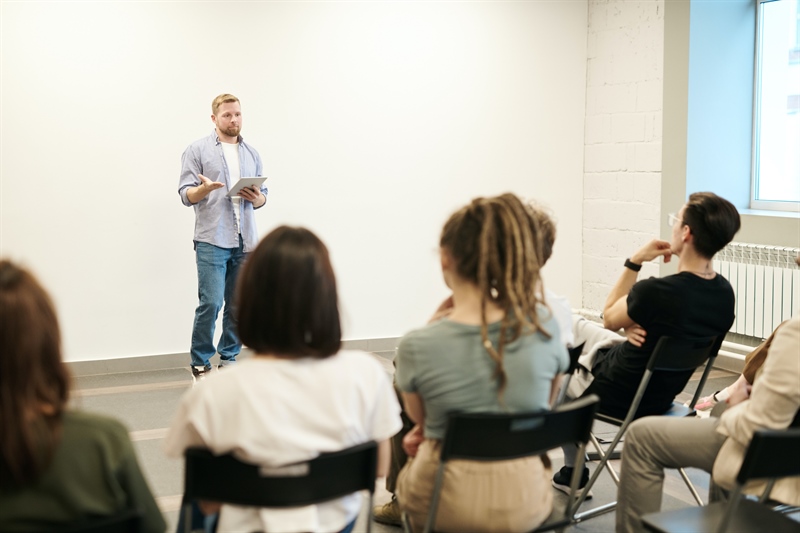Frequently Asked Questions About Recovery Support Meetings
Recovery support meetings are often a crucial part of the success of people in long-term recovery

Q. Do I have to attend meetings to get or stay sober?
A. Attendance at meetings is optional unless required as part of an outpatient or probation program or as part of a requirement for residential treatment or sober living agreement. Meeting attendance is encouraged to allow for continual education and social support during the recovery process. Groups are comprised of individuals who have common experiences and challenges with drug and alcohol use disorders and share coping skills to help each other on the recovery journey.
Q. Where can I find meetings?
A. Meeting schedules may be found under different recovery meeting categories (see Meetings section of All Sober for detailed meeting type descriptions), locations and schedules online. Information is also available in print form from local AA and NA Intergroup offices.
Q. How long are the meetings?
A. Meetings typically run one hour in length and, less frequently, for one and a half hours. Check local schedules for more information.
Q. Do I have to be sober to attend a meeting?
A. No. However, it is suggested that individuals consider refraining from substance use prior to attending meetings to retain as much information from the groups that would be helpful to ongoing recovery.
Q. Are meetings safe?
A. Yes. Most meetings, 12-step as well as other recovery support meetings, honor anonymity. You are not required to share your name or details about your personal life unless you choose to volunteer information on a first-name basis. Meetings are conducted by a volunteer chairperson or an individual assigned to conduct the meeting. One is always at liberty to depart a meeting at any point, especially if discomforted or if the meeting does not personally feel “safe.” It is always a personal choice. There are many meetings from which to choose, and the option to attend a different meeting is always available.
Q. What are 12-step meetings?
A. The 12-step program addresses issues related to alcoholism and has since been adopted in structure by Narcotics Anonymous and dozens of other addiction-related recovery programs. Developed in the 1930s, the first 12-step program, Alcoholics Anonymous, aided its membership in overcoming alcohol use disorder. Since that time, dozens of organizations have been formed based on the AA program that utilize a version of AA’s suggested 12 steps, first published in 1939 in “Alcoholics Anonymous,” commonly known as the Big Book. Steps are put forth as suggestions, and the only requirement for membership is a desire to seek abstinence or an end to harmful behaviors.
Q. Do I have to sign up or pay money to attend?
A. No. People do make voluntary contributions to help pay rent for the meeting facility. Information shared on phone lists is also voluntary. Meetings are advertised and open to anyone wishing to attend to find out more about group and program offerings.
Q. How often do I have to attend meetings?
A. Meeting attendance is strictly a personal decision. Often, those new to the recovery process elect to attend more often for both educational and social reasons.
Q. Are there gender-specific meetings? LGBTQ+ meetings?
A. Yes. Gender-specific and special-interest groups are available in most areas. Check local listings.
Q. What is an “open meeting”?
A. Open meetings are for members of the community who wish to obtain more information about the Alcoholics Anonymous (AA) program of recovery from alcoholism. Non-alcoholics may attend as observers.
Q. What is a “closed meeting”?
A. Closed meetings are for any person, anywhere, who thinks they may have a desire to stop drinking. The purpose of the meeting as outlined in the AA preamble is for meeting attendees (members) to “share their experience, strength and hope with each other that they may solve their common problem and help others to recover from alcoholism.”
Q. Are meetings religious?
A. Meetings do not encompass religious practices but are spiritual in nature. Most 12-step meetings and literature do contain references to “God” or a “higher power” as means of connecting to a source of strength in developing recovery programs of the individual.
Q. Where can I find secular meetings?
A. Secular meetings embrace a clear separation from any religious or spiritual framework. They are based on self-awareness and modification of thoughts, actions and behaviors. Research online for SMART Recovery, LifeRing and Moderation Management meeting schedules.
Q. Are meetings available 24/7?
A. Since the COVID-19 pandemic, many more meetings are happening online, meaning that it is possible to find a meeting practically any time of day or night. Check listings for late-night in-person meetings, virtual and telephone meetings.
Q. Are meetings available online or by telephone?
A. Yes. Online video meetings and teleconference meetings are available to attend. Check local and specific recovery meeting websites for schedules and online access information.
Q. Can I bring my spouse or family members to a meeting?
A. Check recovery websites for general rules for meeting participants. See above definition of “open” meetings for Alcoholics Anonymous.
Q. Are there meetings available where I can bring my children?
A. Some meeting schedules published online note childcare availability. It is recommended that the recovering person first attend individually to find out specific group rules regarding family member attendance.
Q. What is the “anonymous” principle?
A. At the personal level, anonymity provides protection for all members from identification as alcoholics, a safeguard often of special importance to newcomers.
Q. What is a sponsor?
A. A sponsor is an alcoholic or drug addict who has made some progress in the recovery program and shares that experience on a continual, one-on-one basis with another individual who is attempting to attain or maintain recovery from alcoholism or drug addiction.
To find out more about specific meetings and group support options, visit the Support Groups section of All Sober.
More Help & Information
Sobriety vs. Recovery: What's the Difference?
Are the concepts themselves up for debate? Do they require certain treatments, or abstinence from everything? It's complicated! And new ways of thinking are changing the conversation.
Now Elite NFL Players, They First Tackled Addiction | News Roundup
All Sober compiles the best of the latest headlines. Here's your addiction and recovery news for the week of Feb. 19, 2024!
Help Them Help You: Explaining Your Mental Health to Your Family
Your mental health can affect — and be affected by — your loved ones. Here's how to discuss it with them so everyone can heal.
Dry January (and Beyond): The Possibilities Are Endless
There's never been a better time to go sober. Whether you're trying it out this month or already living the life, join us for some tips, ideas, inspiration — and maybe even new friends.
Sober Holiday Tips: Meeting 'Share-a-Thons'
Need to get out of the house for a bit and see some friendly sober faces? Recovery support group meeting marathons run 24/7 from Christmas Eve through New Year's Day.
What Happens After an Intervention?
Your loved one agreed to get treatment for addiction during their intervention — or not. Here's what you need to know about what comes next.
We're in This Together: Building a Healthy Sober Support Network
You are the captain of your recovery, but you don't have to do it alone. A sober support network will lift you up in tough times and celebrate your triumphs.
Real-Life Recovery Tips: Phone a Friend
When you're traveling, you can take your sober support network with you — right in your pocket. Rocker Kasim Sulton shares his top recovery tip in this video.











